In Malaysia, there would have been Peaceful Assemblies protesting what was happening in Gaza - but with the Peaceful Assembly Act 2012(an Act that deteriorated peoples' right to Peaceful Assembly), which requires the organiser/s to pre-identify themselves, give notice of 5 days, get written consent of the owner of the place the Peaceful Assembly will happen, arrange for security and worse risk being responsible for any crimes any participant may takes. In short, the right to Peaceful Assembly has deteriorated.
What is happening to the Palestinian people in Gaza and West Bank cannot be considered a 'war' but an escalation of the oppression faced by the Palestinians. The Palestinian issue requires an historical understanding of the issue.
The indigenous local inhabitants were never given a SAY - when the British colonial authorities supported the call of the Zionist movement for the establishment of a Jewish State in the region. This followed with permitted (maybe even facilated) large migration of foreign Jews into the region - and after World War 2, a recognition of the right of the Jews to establish a Jewish State, which led to the formation of Israel.
This also result in 'ethnic cleansing' activities that saw the expulsion of Palestinians including destruction of their homes.
Israel did not stay with the UN decided borders but today are also occupying lands that was supposed to be for an independent Palestinian State, and also lands belonging to other nation states like Golan Heights(Syria). UN recognizes Golan Heights as Syrian land occupied by the US. Recently, Israel claimed that Golan Heights is part of Israel and annexed it on 1981. Worse, US agreed - ' Trump signed a proclamation officially granting U.S. recognition of the Golan Heights as Israeli territory, in a dramatic shift from decades of U.S. policy. Israel seized the strategic land from Syria in the 1967 Middle East war. Recently(about 4 days ago), Israeli soldiers launched fire in the form of artillery and mortar for the occupied Golan Heights territory into Syria on Tuesday in a first exchange between the two amid the Gaza-Israel war. - The New Arab
JERUSALEM - According to the UN Resolution in 1947, it was to be distinct from the future Jewish State(now Israel), and the Arab State(now Palestine). It was to be a 'Special International Regime for the City of Jerusalem' - just like Vatican, a separate State.
After the occupation of West Bank, despite UN Resolutions, Israel continue to build Jewish Settlements in the area, possibly a plan to change the population demography of the area, and maybe ultimately annex West Bank as part of Israel in the near future.
UNITED NATIONS - Why is it not acting? The real power vests in the UN Security Council, and The Security Council of 15 members has five permanent members—the United States, China, France, Russia, and the United Kingdom. Any one of them can veto a resolution. US and some Israeli friendly nation with VETO powers have made it impossible for the UN to act strongly - demanding that Israel give independence to Occupied Territories, and allow Palestine full independence.
UN Peacekeeping Forces could enter the Occupied regions, and end violence and restore Peace > but again there is a problem here not just with the US and other superpowers, but even NATO(North Atlantic Treaty Organisation), where US is a member. NATO chief Jens Stoltenberg on Wednesday said Israel has the "right to defend itself" but added that any response was expected to be "proportionate." Israel is recognized as a major non-NATO ally.
So, even if the UN is to send in a peacekeeping force, it must not include US, or other nations like that. It must be comprised by nation states that are independent and interest in justice in the region.
STOP THE VIOLENCE, AND IMMEDIATE WITHDRAWAL OF ISRAEL FROM ALL OCCUPIED TERRITORIES.
FULL INDEPENDENCE TO PALESTINE - free and fair elections too
Muhyidin's statement on Palestine is not sufficient to address 'forced eviction' of Palestinians, illegal settlement of Israelis and other fundamental issues?
Palestinian Issue - Independence? 2-State Solution? British created problem? UN membership?
GAZA : An understanding of history helps - Boycott good way to express ourself
Palestinian Crisis - Forgotten with the ceasefire? Fundamental HR violations in Palestine and the UN? Free and Fair Elections? Democracy?
500 protest in front US Embassy on 2nd October?
Ceasefire in Gaza - but Boycott of American Products must continue until justice is done..
What’s the Israel-Palestine conflict about? A simple guide
It’s killed tens of thousands of people and displaced millions. And its future lies in its past. We break it down.
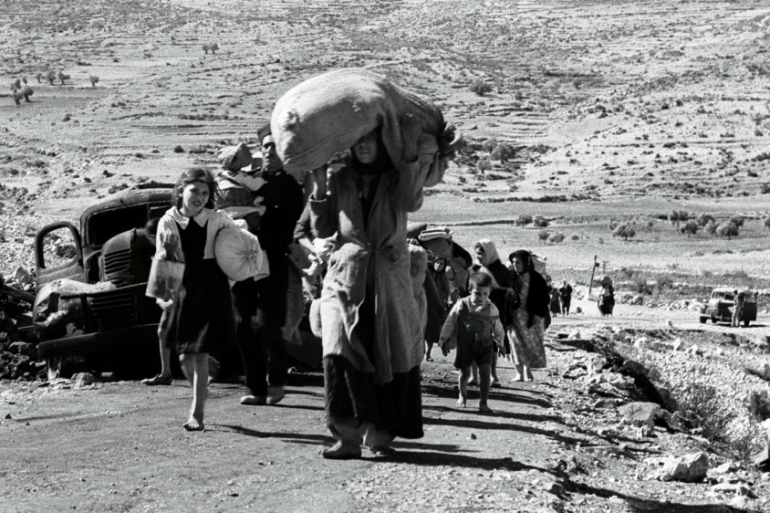
With Israel declaring war on the Gaza Strip after an unprecedented attack by the armed Palestinian group Hamas on Saturday, the world’s eyes are again sharply focused on what might come next.
Hamas fighters have killed more than 800 Israelis in assaults on multiple towns in southern Israel. In response, Israel has launched a bombing campaign in the Gaza Strip, killing more than 500 Palestinians. It has mobilised troops along the Gaza border, apparently in preparation for a ground attack. And on Monday, it announced a “total blockade” of the Gaza Strip, stopping the supply of food, fuel and other essential commodities to the already besieged enclave in an act that under international law amounts to a war crime.
But what unfolds in the coming days and weeks has its seed in history.
For decades, Western media outlets, academics, military experts and world leaders have described the Israeli-Palestinian conflict as intractable, complicated and deadlocked.
Here’s a simple guide to break down one of the world’s longest-running conflicts:
What was the Balfour Declaration?
- More than 100 years ago, on November 2, 1917, Britain’s then-foreign secretary, Arthur Balfour, wrote a letter addressed to Lionel Walter Rothschild, a figurehead of the British Jewish community.
- The letter was short – just 67 words – but its contents had a seismic effect on Palestine that is still felt to this day.
- It committed the British government to “the establishment in Palestine of a national home for the Jewish people” and to facilitating “the achievement of this object”. The letter is known as the Balfour Declaration.
- In essence, a European power promised the Zionist movement a country where Palestinian Arab natives made up more than 90 percent of the population.
- A British Mandate was created in 1923 and lasted until 1948. During that period, the British facilitated mass Jewish immigration – many of the new residents were fleeing Nazism in Europe – and they also faced protests and strikes. Palestinians were alarmed by their country’s changing demographics and British confiscation of their lands to be handed over to Jewish settlers.What happened during the 1930s?
- Escalating tensions eventually led to the Arab Revolt, which lasted from 1936 to 1939.
- In April 1936, the newly formed Arab National Committee called on Palestinians to launch a general strike, withhold tax payments and boycott Jewish products to protest British colonialism and growing Jewish immigration.
- The six-month strike was brutally repressed by the British, who launched a mass arrest campaign and carried out punitive home demolitions, a practice that Israel continues to implement against Palestinians today.
- The second phase of the revolt began in late 1937 and was led by the Palestinian peasant resistance movement, which targeted British forces and colonialism.
- By the second half of 1939, Britain had massed 30,000 troops in Palestine. Villages were bombed by air, curfews imposed, homes demolished, and administrative detentions and summary killings were widespread.
- In tandem, the British collaborated with the Jewish settler community and formed armed groups and a British-led “counterinsurgency force” of Jewish fighters named the Special Night Squads.
- Within the Yishuv, the pre-state settler community, arms were secretly imported and weapons factories established to expand the Haganah, the Jewish paramilitary that later became the core of the Israeli army.
- In those three years of revolt, 5,000 Palestinians were killed, 15,000 to 20,000 were wounded and 5,600 were imprisoned.
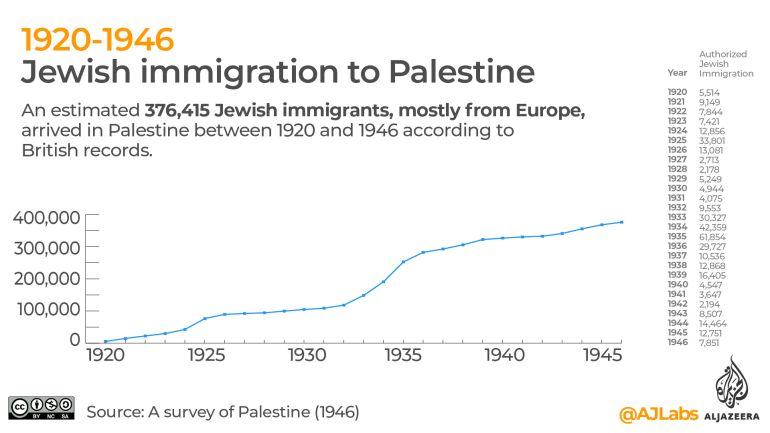
What was the UN partition plan?
- By 1947, the Jewish population had ballooned to 33 percent of Palestine, but they owned only 6 percent of the land.
- The United Nations adopted Resolution 181, which called for the partition of Palestine into Arab and Jewish states.
- The Palestinians rejected the plan because it allotted about 56 percent of Palestine to the Jewish state, including most of the fertile coastal region.
- At the time, the Palestinians owned 94 percent of historic Palestine and comprised 67 percent of its population.

The 1948 Nakba, or the ethnic cleansing of Palestine
- Even before the British Mandate expired on May 14, 1948, Zionist paramilitaries were already embarking on a military operation to destroy Palestinian towns and villages to expand the borders of the Zionist state that was to be born.
- In April 1948, more than 100 Palestinian men, women and children were killed in the village of Deir Yassin on the outskirts of Jerusalem.
- That set the tone for the rest of the operation, and from 1947 to 1949, more than 500 Palestinian villages, towns and cities were destroyed in what Palestinians refer to as the Nakba, or “catastrophe” in Arabic.
- An estimated 15,000 Palestinians were killed, including in dozens of massacres.
- The Zionist movement captured 78 percent of historic Palestine. The remaining 22 percent was divided into what are now the occupied West Bank and the besieged Gaza Strip.
- An estimated 750,000 Palestinians were forced out of their homes.
- Today their descendants live as six million refugees in 58 squalid camps throughout Palestine and in the neighbouring countries of Lebanon, Syria, Jordan and Egypt.
- On May 15, 1948, Israel announced its establishment.
- The following day, the first Arab-Israeli war began and fighting ended in January 1949 after an armistice between Israel and Egypt, Lebanon, Jordan and Syria.
- In December 1948, the UN General Assembly passed Resolution 194, which calls for the right of return for Palestinian refugees.
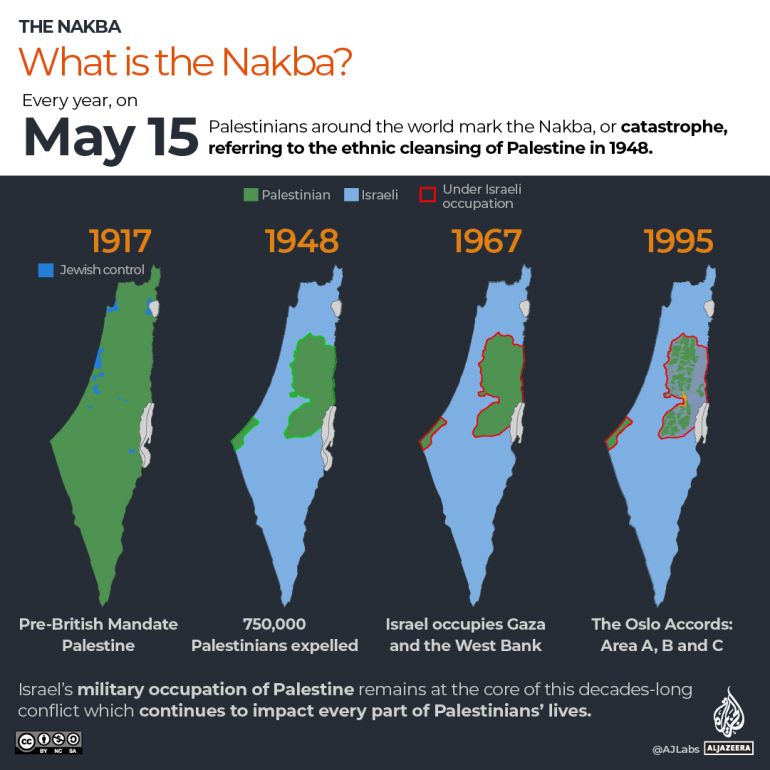
The years after the Nakba
- At least 150,000 Palestinians remained in the newly created state of Israel and lived under a tightly controlled military occupation for almost 20 years before they were eventually granted Israeli citizenship.
- Egypt took over the Gaza Strip, and in 1950, Jordan began its administrative rule over the West Bank.
- In 1964, the Palestinian Liberation Organisation (PLO) was formed, and a year later, the Fatah political party was established.
The Naksa, or the Six-Day War and the settlements
- On June 5, 1967, Israel occupied the rest of historic Palestine, including the Gaza Strip, the West Bank, East Jerusalem, the Syrian Golan Heights and the Egyptian Sinai Peninsula during the Six-Day War against a coalition of Arab armies.
- For some Palestinians, this led to a second forced displacement, or Naksa, which means “setback” in Arabic.
- In December 1967, the Marxist-Leninist Popular Front for the Liberation of Palestine was formed. Over the next decade, a series of attacks and plane hijackings by leftist groups drew the world’s attention to the plight of the Palestinians.
- Settlement construction began in the occupied West Bank and Gaza Strip. A two-tier system was created with Jewish settlers afforded all the rights and privileges of being Israeli citizens whereas Palestinians had to live under a military occupation that discriminated against them and barred any form of political or civic expression.

The first Intifada 1987-1993
- The first Palestinian Intifada erupted in the Gaza Strip in December 1987 after four Palestinians were killed when an Israeli truck collided with two vans carrying Palestinian workers.
- Protests spread rapidly to the West Bank with young Palestinians throwing stones at Israeli army tanks and soldiers.
- It also led to the establishment of the Hamas movement, an off-shoot of the Muslim Brotherhood that engaged in armed resistance against the Israeli occupation.
- The Israeli army’s heavy-handed response was encapsulated by the “Break their Bones” policy advocated by then-Defence Minister Yitzhak Rabin. It included summary killings, closures of universities, deportations of activists and destruction of homes.
- The Intifada was primarily carried out by young people and was directed by the Unified National Leadership of the Uprising, a coalition of Palestinian political factions committed to ending the Israeli occupation and establishing Palestinian independence.
- In 1988, the Arab League recognised the PLO as the sole representative of the Palestinian people.
- The Intifada was characterised by popular mobilisations, mass protests, civil disobedience, well-organised strikes and communal cooperatives.
- According to the Israeli human rights organisation B’Tselem, 1,070 Palestinians were killed by Israeli forces during the Intifada, including 237 children. More than 175,000 Palestinians were arrested.
- The Intifada also prompted the international community to search for a solution to the conflict.
The Oslo years and the Palestinian Authority
- The Intifada ended with the signing of the Oslo Accords in 1993 and the formation of the Palestinian Authority (PA), an interim government that was granted limited self-rule in pockets of the occupied West Bank and Gaza Strip.
- The PLO recognised Israel on the basis of a two-state solution and effectively signed agreements that gave Israel control of 60 percent of the West Bank, and much of the territory’s land and water resources.
- The PA was supposed to make way for the first elected Palestinian government running an independent state in the West Bank and Gaza Strip with its capital in East Jerusalem, but that has never happened.
- Critics of the PA view it as a corrupt subcontractor to the Israeli occupation that collaborates closely with the Israeli military in clamping down on dissent and political activism against Israel.
- In 1995, Israel built an electronic fence and concrete wall around the Gaza Strip, snapping interactions between the split Palestinian territories.

The second Intifada
- The second Intifada began on September 28, 2000, when Likud opposition leader Ariel Sharon made a provocative visit to the Al-Aqsa Mosque compound with thousands of security forces deployed in and around the Old City of Jerusalem.
- Clashes between Palestinian protesters and Israeli forces killed five Palestinians and injured 200 over two days.
- The incident sparked a widespread armed uprising. During the Intifada, Israel caused unprecedented damage to the Palestinian economy and infrastructure.
- Israel reoccupied areas governed by the Palestinian Authority and began construction of a separation wall that along with rampant settlement construction, destroyed Palestinian livelihoods and communities.
- Settlements are illegal under international law, but over the years, hundreds of thousands of Jewish settlers have moved to colonies built on stolen Palestinian land. The space for Palestinians is shrinking as settler-only roads and infrastructure slice up the occupied West Bank, forcing Palestinian cities and towns into bantustans, the isolated enclaves for Black South Africans that the country’s former apartheid regime created.
- At the time the Oslo Accords were signed, just over 110,000 Jewish settlers lived in the West Bank, including East Jerusalem. Today, the figure is more than 700,000 living on more than 100,000 hectares (390sq miles) of land expropriated from the Palestinians.
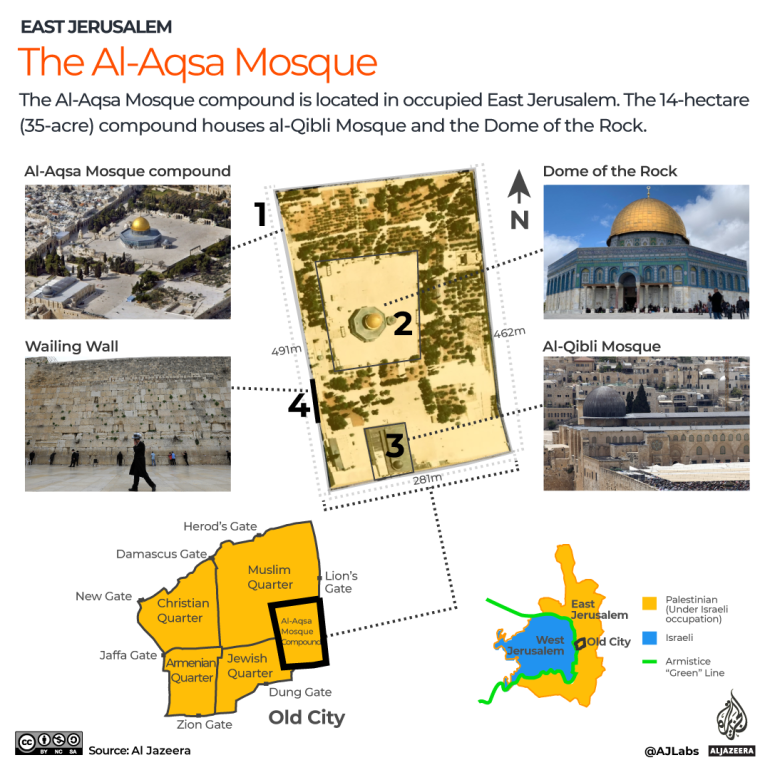
The Palestinian division and the Gaza blockade
- PLO leader Yasser Arafat died in 2004, and a year later, the second Intifada ended, Israeli settlements in the Gaza Strip were dismantled, and Israeli soldiers and 9,000 settlers left the enclave.
- A year later, Palestinians voted in a general election for the first time.
- Hamas won a majority. However, a Fatah-Hamas civil war broke out, lasting for months, resulting in the deaths of hundreds of Palestinians.
- Hamas expelled Fatah from the Gaza Strip, and Fatah – the main party of the Palestinian Authority – resumed control of parts of the West Bank.
- In June 2007, Israel imposed a land, air and naval blockade on the Gaza Strip, accusing Hamas of “terrorism”.
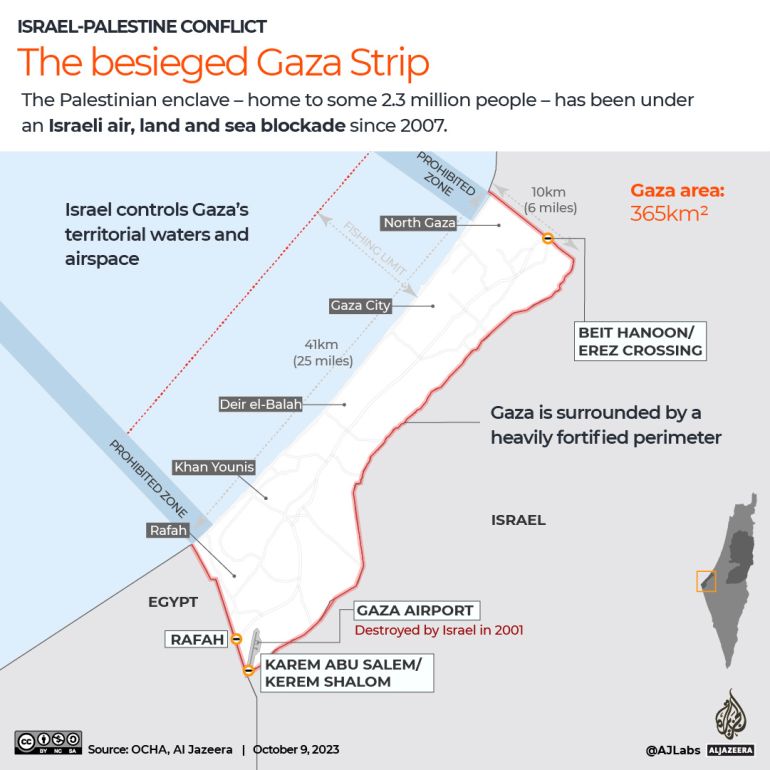
The wars on the Gaza Strip
- Israel has launched four protracted military assaults on Gaza: in 2008, 2012, 2014 and 2021. Thousands of Palestinians have been killed, including many children, and tens of thousands of homes, schools and office buildings have been destroyed.
- Rebuilding has been next to impossible because the siege prevents construction materials, such as steel and cement, from reaching Gaza.
- The 2008 assault involved the use of internationally banned weaponry, such as phosphorus gas.
- In 2014, over a span of 50 days, Israel killed more than 2,100 Palestinians, including 1,462 civilians and close to 500 children.
- During the assault, called Operation Protective Edge by the Israelis, about 11,000 Palestinians were wounded, 20,000 homes were destroyed and half a million people displaced .
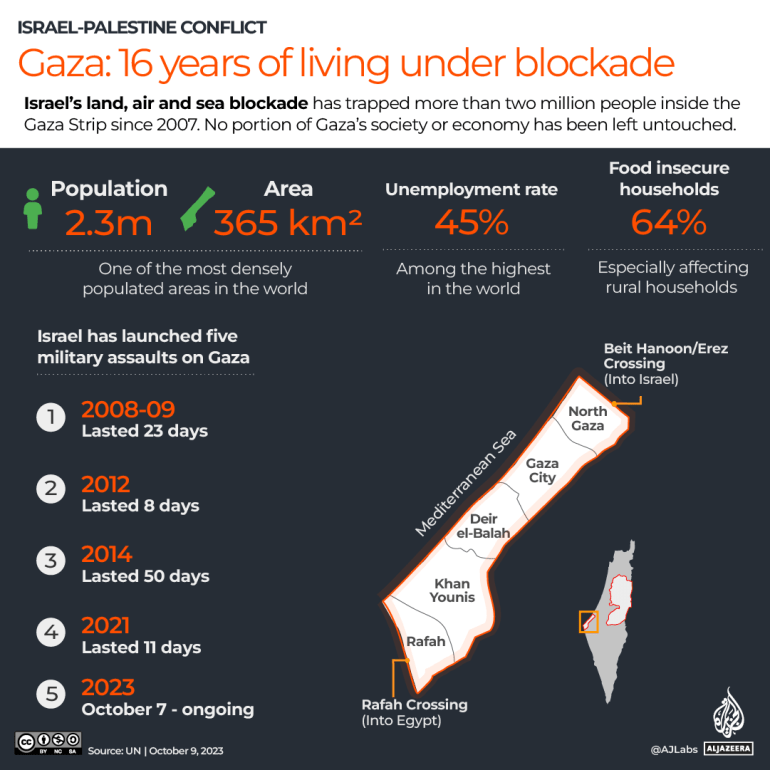
Israel: UN experts urge international community to end forced displacement and annexation of occupied territory
13 April 2023
GENEVA (13 April 2023) – The international community must take immediate action to stop Israel’s forced evictions and displacement of Palestinians in East Jerusalem as part of Israel’s annexation and de-Palestinianisation of the city, UN experts* said today.
“The world's attention has been focused on Israel's recklessness in Al-Aqsa, rockets fired from Gaza, Lebanon and Syria, with deadly attacks against Israeli and international civilians making headlines. All the while, tenfold Palestinian deaths were not making similar headlines,” the experts said.
“There has been an ongoing and unchecked tragedy: the forced eviction of Palestinians from their homes,” they said.
“Despite efforts of international organisations and activists, Palestinians under Israeli occupation continue to be forced out of their homes and dispossessed of their land and properties on the basis of discriminatory laws,” the experts said. They said these laws were designed to consolidate Jewish ownership in Jerusalem, irredeemably altering its demographic composition and status.
“Israel’s transfer of its own population into the occupied territory confirms a deliberate intention to colonise the territory it occupies – a practice strictly prohibited by international humanitarian law,” they said, reiterating their past statement. “It amounts to a prima facie war crime.”
An estimated 150 Palestinian families in the Old City of Jerusalem adjacent neighbourhoods such as Silwan and Sheikh Jarrah are at risk of forced eviction and displacement by Israeli authorities and settler organisations. Over the past decades, hundreds of Palestinian properties in occupied East Jerusalem have been taken over by settlers, in part due to a law that claims to allow the transfer of pre-1948 Jewish property to the ‘original Jewish owners’ or their ‘heirs’. According to the experts the law helps settler organizations expropriate Palestinian properties through a manipulation of the law.
“This is lawfare in action. The law is discriminatory and acquisitive by design, and no such right to restitution exists for the over 1 million Palestinians and their descendants who were displaced and dispossessed from Jerusalem, Israel, and the rest of the West Bank and Gaza as of 1947 and in 1967. They are still longing for justice,” the UN experts said.
The experts expressed specific concern for three families in East Jerusalem: the Shehade family in Silwan, the Ghaith-Sub Laban family in the Old City, and the Salem family in Sheikh Jarrah. Despite living in their homes for many decades under a protected tenancy lease, these families have faced eviction lawsuits filed by settler organisations seeking to take over their properties for years. The Ghaith-Sub Laban family has already exhausted all legal avenues to challenge the eviction order, and the Israeli authorities have served them with a notice to vacate their house by 25 April, or face forced eviction.
“This is in blatant violation of international law that does not confer the occupying Power the authority to change the local legislation unless strictly required by security needs: settler-colonial intent and interests are not a security need,” the experts said.
“The establishment and expansion of settlements constitute a grave breach of international law, prosecutable under the Rome Statute. No State should passively acquiesce with these illegal acts to trump the rights of Palestinians to self-determination, adequate housing, property, non-discrimination” the experts stressed.
“For the Palestinians, the enjoyment of human rights is a far-off hope as the suppression of these rights is part of the very architecture of the Israeli occupation,” they said. “The almost 56-year long occupation and the way it is allowed to conduct itself with general impunity and without consequences, makes a farce of international law and the credibility of the system mandated to enforce it. The occupation must end with all deliberate speed and until that day, Israel must comply fully with international humanitarian law and international human rights law obligations.”
The experts have repeatedly raised these issues with the Government of Israel without any response to date.
ENDS
*The experts: Francesca Albanese, Special Rapporteur on the situation of human rights in the Palestinian Territory occupied since 1967; Balakrishnan Rajagopal, Special Rapporteur on the right to adequate housing; and Paula Gaviria Betancur, Special Rapporteur on the human rights of internally displaced persons.
The Special Rapporteurs are part of what is known as the Special Procedures of
the Human Rights Council. Special Procedures, the largest body of
independent experts in the UN Human Rights system, is the general name
of the Council’s independent fact-finding and monitoring mechanisms that
address either specific country situations or thematic issues in all
parts of the world. Special Procedures experts work on a voluntary
basis; they are not UN staff and do not receive a salary for their work.
They are independent from any government or organization and serve in
their individual capacity. - UN News, 13/4/2023





No comments:
Post a Comment